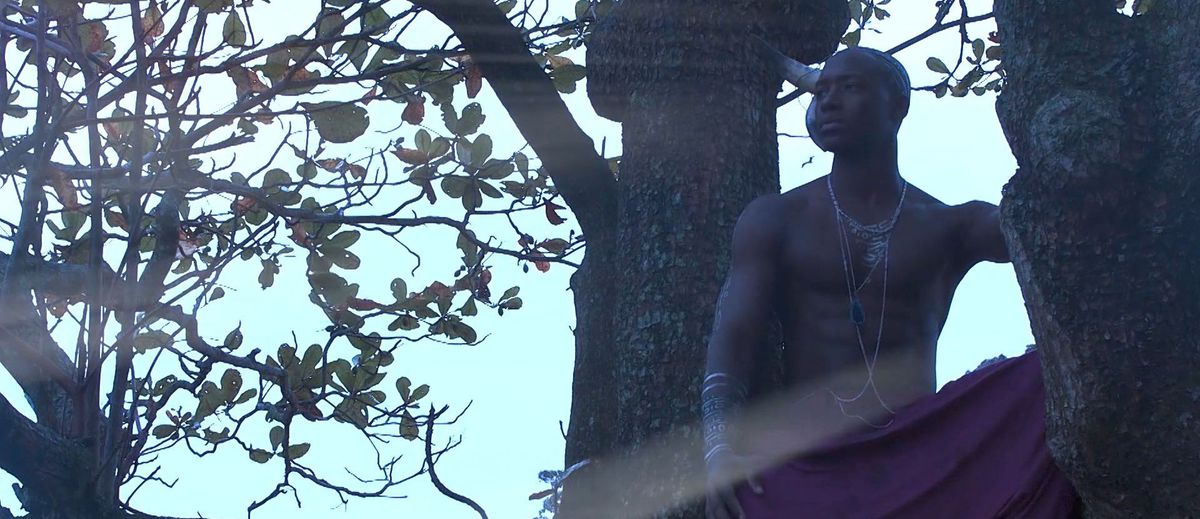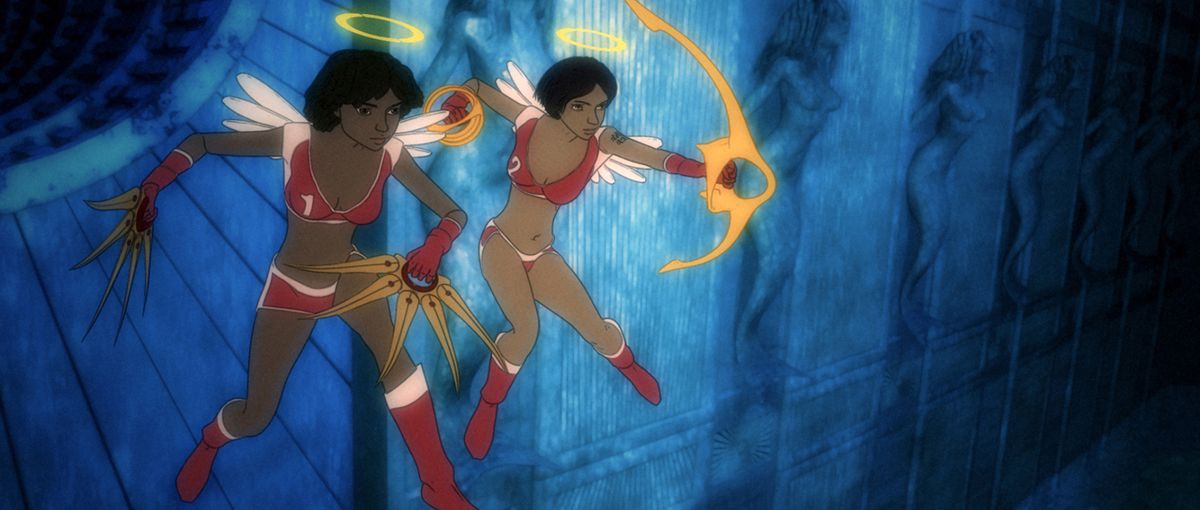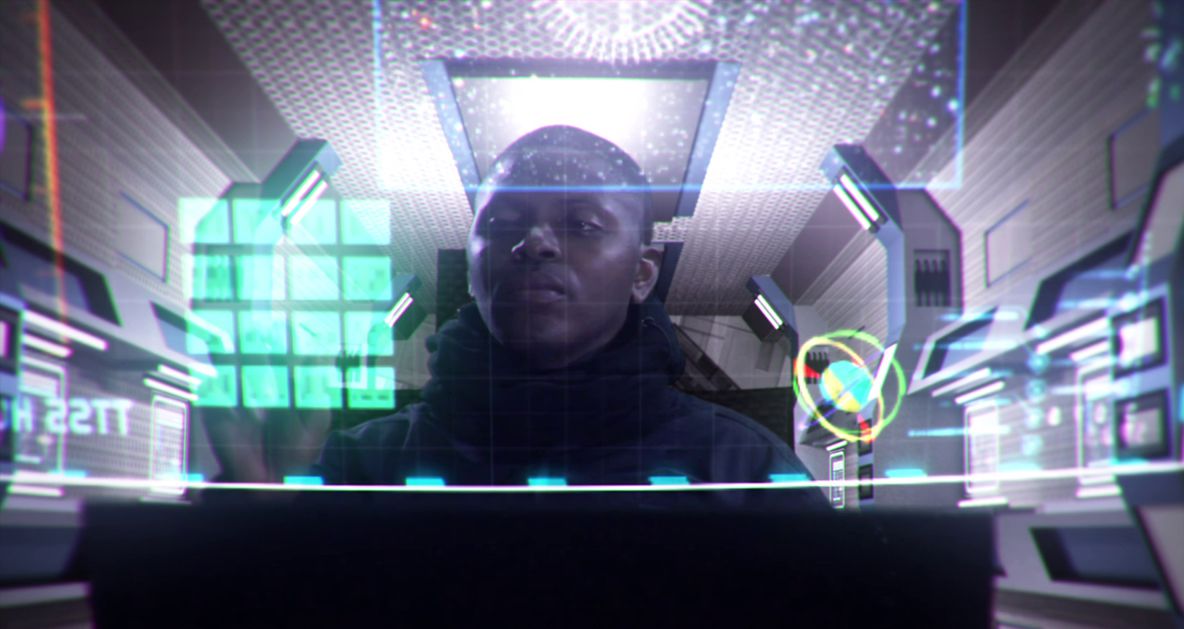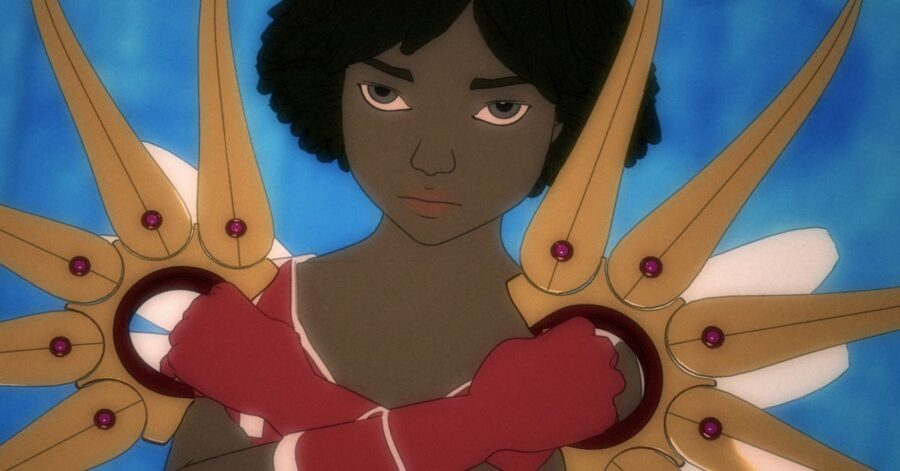Speculative fiction concerns itself with the future, with advances in technology and the endless possibilities of extraterrestrial life. But it often tells stories of the past and present, built around the same kinds of themes as mainstream fiction: conquest, betrayal, revolution, and the power of human relationships. Recent movements in sci-fi literature, led by a new cadre of increasingly diverse writers, have offered new ways to tell these stories, by drawing on traditions from various cultures. Afrofuturism, a movement that gained popularity with Marvel’s Black Panther and Beyonce’s Black is King, draws inspiration from African diasporic culture to tell these familiar stories.
The free online film festival Afrofuturism: Blackness Revisualized acts as an introduction and an invitation to the genre. The film collection, curated by Black futurist and filmmaker Celia C. Barnes, includes an international selection of 10 Afrofuturist films, two feature-length and eight shorts, from America, Nigeria, Martinique, and Trinidad and Tobago.

The films chosen for the festival vary widely in genre and medium, showing the range of works that fall under the Afrofuturism movement. In an introduction video to the festival, called “Afrofuturism 101,” Barnes describes the movement as “a platform where Black people realize our own liberation by exploring self-determined futures through many facets of expression.” The films follow this thesis, showing a range of both immediate and far-off futures imagined by Black independent filmmakers. The collection may seem incohesive at first glance, but all of the films apply the Black gaze to sci-fi, resulting in unique works that may not have found an audience outside of the Afrofuturism movement.
The films of Afrofuturism: Blackness Revisualized tell familiar stories in established genres. The uniqueness comes from the filmmakers’ perspective, and their inclusion of cultural details that are still underrepresented in science fiction as a whole.
The inclusion of African diasporic culture enrichens the storytelling and suggests the future of science fiction as a whole, as one editor tells Polygon in an interview. “In science fiction or fantasy, we’re used to working with tropes. That’s what people really love. They love seeing the things they grew up with remixed and rehashed. And as soon as you add new voices and cultures, new perspectives, the things people may have been tired of feel original,” says Orbit/Redhook editor Nivia Evans.
The standout of the festival is Battledream Chronicle, a feature-length animated film by writer-director Alain Bidard, from the Caribbean island of Martinique. The film takes place in the year 2100 on an Earth covered in lethal levels of pollution, where the world has been colonized by the country of Mortemonde. The country uses a video game, called Battledream, to enslave those it defeats. Syanna Meridian, a young Martinician slave, must play the game daily to farm XP for the leaders of Mortemonde, delivering 3000 XP per month or facing death. One day, Syanna discovers the Firebird, a Battledream weapon strong enough to destroy the empire, and has to decide whether to rise up or use the weapon to buy her freedom.

The first-ever full-length animated film from Martinique, in French with English subtitles, Battledream Chronicle is a marvel of breathtaking animation, realistic and digitally stylized at the same time. The plot is a story of conquest and revolution, a popular topic in science fiction, but it also holds the history of Martinique, a French-Caribbean island and former colony with a history of slave insurrections. In the film, this power struggle is played out through a video game where the colonizers have special abilities and cheat codes that keep them winning, and therefore in power. The weapons and abilities in the game are inspired by multiple cultures, with Creole, Egyptian, and Greek mythology, among others. Many of the characters have realistic struggles, deciding between submission and revolution while considering the fate of their families and friends.
The short film that launched the festival, Souls, shows a more terrestrial and familiar vision of Afrofuturism. In Malakai’s film, a young girl named Kai faces the declining health of her grandmother, Hattie, a cosmologist who is confronting Alzheimer’s. The film uses both sunlight and starlight as metaphors for the human spirit, as it tells the story of Hattie’s transition to the afterlife and how it affects Kai and her mother, Sinea, played by Tabitha Brown. It also shows a realistic and sympathetic portrayal of Alzheimer’s through Johan Beckles’ performance, which includes scenes interacting with Kai and Sinea as well as self-recorded notes of memories.
Another notable short is Sight, directed by Janeen Talbott. The film follows Naji Bloom, a woman living in a technologically advanced future where mankind relies on spirits for guidance, in the tradition of African folklore. At a time of crisis, Bloom is announced as a candidate to become her tribe’s new seer, a leader who communicates with spirits. Though she initially doesn’t believe in spirits or the intangible, she comes into contact with one and must decide whether to become a seer and make a sacrifice that shows the extent of her faith. The short offers an excellent example of quick world-building, made successful in part because of excellent costuming and set design, with a story acting as a neat allegory on the sacrifices that faith requires.

The festival’s second feature-length film, Tomb, is an elegant tale of space exploration and artificial intelligence from Trinidadian director Nick Attin, depicting a multinational deep-space mission in the year 2025. The first act of the film is slowly paced, focused on the logistics of testing the special AI assistant designed for the expedition. Once the trip sets off, the film follows Commander Nelson Obatala, who must go off-course to rescue his fellow astronaut and friend. The low-budget film is carried forward by engrossing performances by Kearn Samuel as Commander Obatala and Conrad Parris as M.I.L.O., the surprisingly human-like AI. Obatala and M.I.L.O.’s conversations offer an interesting examination of the immense possibilities of artificial intelligence.
Other films in the festival include the alien exploration short Star Thieves, directed by H. Leslie Foster II; The Abandon, an alien-invasion short featuring Emmy-winner Sterling K. Brown; and Hello Rain, directed by Nigerian director C.J. “Fiery” Obasis and based on Nnedi Okorafor’s short story “Hello, Moto.” These films demonstrate the immense capacity of the Afrofuturism movement and Black imagination, and hints at the wealth of films that haven’t received support beyond the independent film market. Many of these excellent shorts would not never have been available to the general public, if not for this highly accessible online festival. Afrofuturism: Blackness Revisualized doesn’t just depict possible futures for the world its and technology, the free festival also suggests the kinds of compelling stories that could be told in the future, if international and POC filmmakers get more financial support.
All the films in Afrofuturism: Blackness Revisualized will be available for free online until the end of 2024, while also broadcasting on the All Arts TV channel.
Polygon – All
Source link
Related Post:
- The Dell Black Friday sale comes early with massive discounts on a wide range of products • Eurogamer.net
- New Hatsune Miku If Nendoroid Imagines Her Without Twintails
- The best weapons in GTA Online for range, speed, power, and more
- Hollywood Voice Cast Revealed For ‘The Last Worker’ At The Venice Film Festival
- The best Warzone sniper rifles for power, range, and speed
- The best WiFi range extenders
- AMD’s Ryzen 7 5800X is a great CPU for a mid-range gaming PC and it’s on sale for $398
- A New Range Of Colourful Switch Accessories Launches Just In Time For Switch OLED (UK)
- The best Naraka Bladepoint weapons for close and long range
- 16mm Film From Nintendo’s 1974 Wild Gunman Arcade Cabinet Has Been Found
